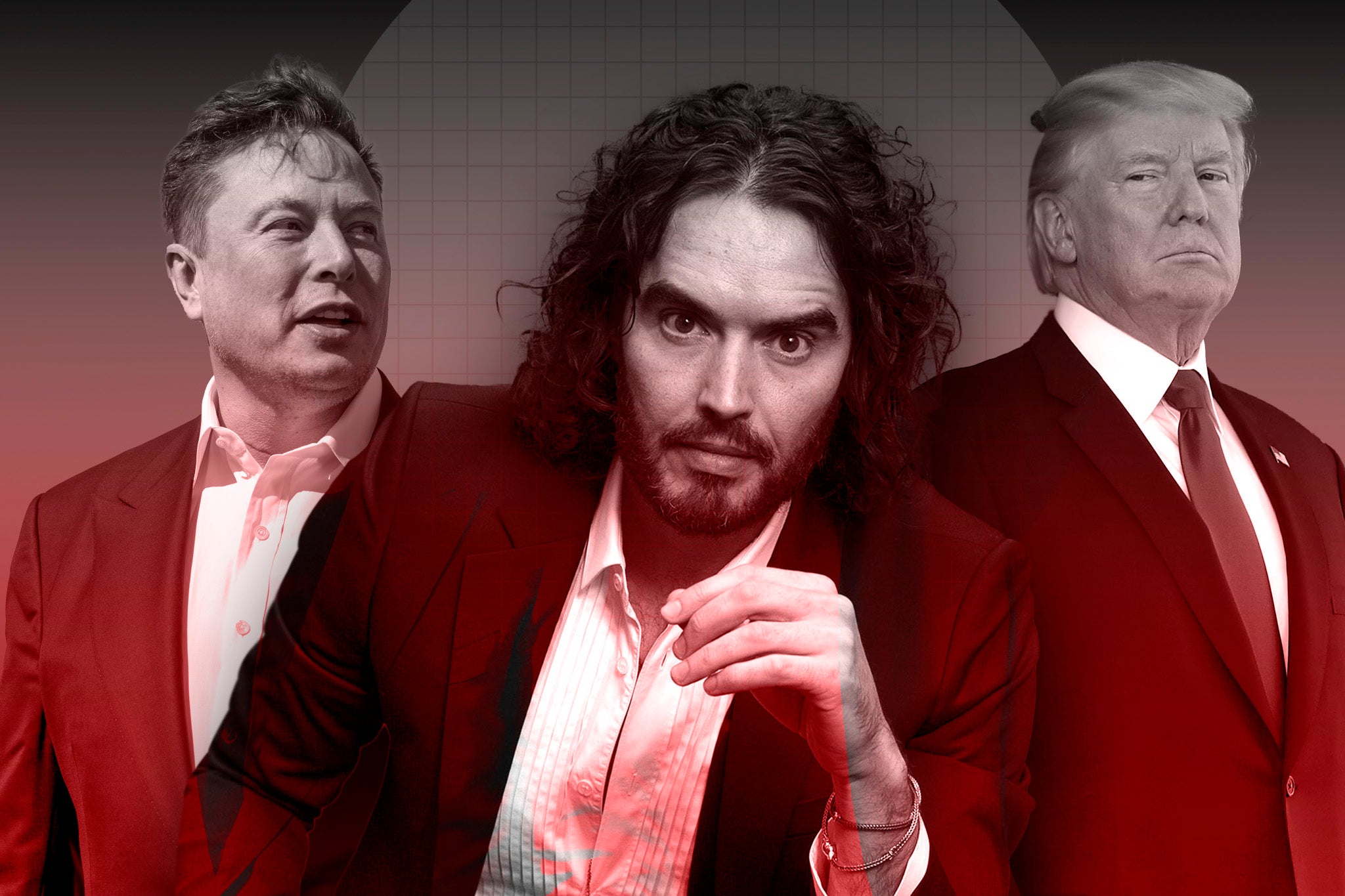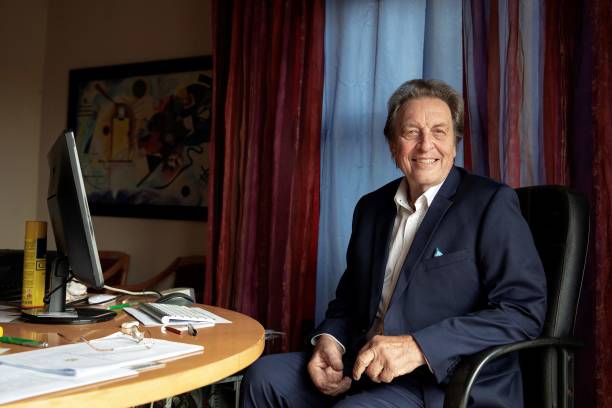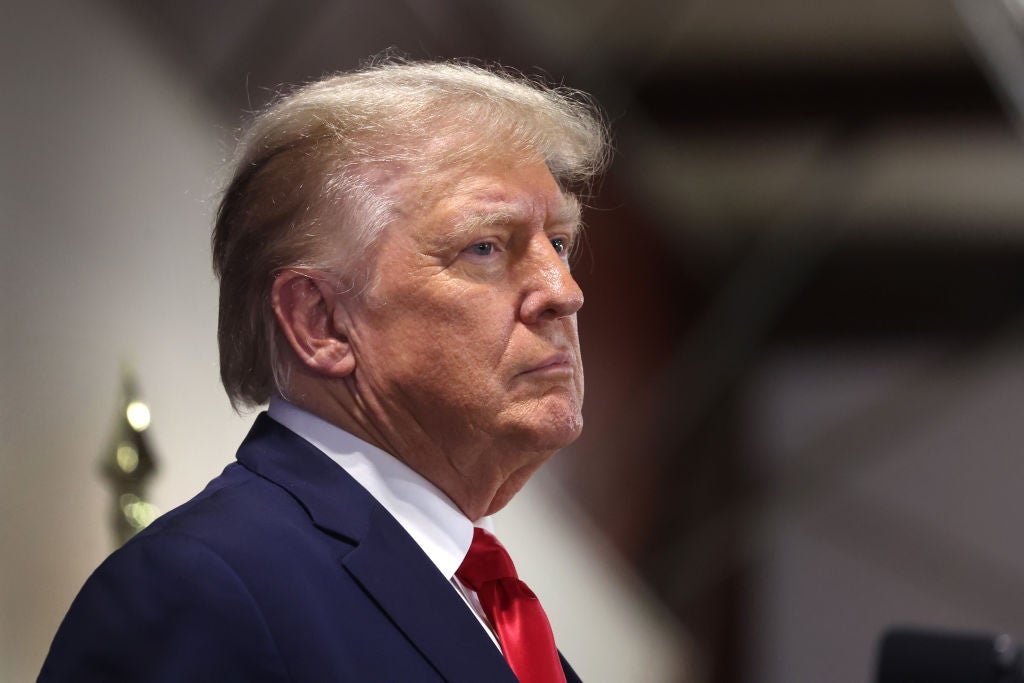The Independent's journalism is supported by our readers. When you purchase through links on our site, we may earn commission.
I was Russell Brand’s biographer – and I can tell you his dad has a lot to answer for
It’s no coincidence that difficult men, from Brand to Trump, have toxic relationships with their fathers, says parenting expert Tanith Carey. ‘Father wounds’ do lasting damage to the sons – and the world around them

It’s hard to imagine a more brutal way for a father to introduce his son to the ways of toxic masculinity.
When Russell Brand turned 16, his dad Ron took him on a luxury trip to the Far East to teach him how to be “a man”. By this, he meant he paid a prostitute to take the boy’s virginity in a Hong Kong hotel room while offering the worst parental role modelling ever by having sex with two others on the bed next to them.
As the author of the first biography of the comedian in 2007, I spent hours talking to a range of Brand’s friends, colleagues, and family members to try and understand what made him tick. It quickly became clear to me that his relationship with his father was core to any understanding of the controversial man he had become.
After leaving his mother, Babs, when Russell was six months old, Ron had, by all accounts, been an absent and unreliable father. Growing up, Russell has spoken openly about being an effeminate, un-sporty kid and having the feeling that his father didn’t like him very much. But after that hotel initiation as a teenager, Brand told of how Ron patted him on the back for going through with the rite of passage – and he was thrilled to finally get his approval.
This week, Ron, now 80, was quick to defend his son, calling the allegations of sexual assault that his son denies, “unproven” and questioning whether “this was seriously the most important thing happening in this world”. In a Facebook post, he wrote: “The Russell Brand vendetta: Like a man who owns an orchard being accused of stealing an apple?”
An unsurprising reaction from a man who appears to be proud to have created a lothario who revelled in treating women as sexual commodities. But then if you’re the kind of man who develops an insatiable appetite for dominance and control, it turns out that having a toxic relationship with your father could be the unfortunate key to your “success”, at least while it lasts.
The way Elon Musk’s father treated him ‘left deep scars’
A new biography of Elon Musk, published this month, also portrays a father as emotionally damaging, but whose toxic parenting equally spurred his son on.
Musk himself said in a 2022 TED Talk: “I did not have a happy childhood, to be frank. It was quite rough.”

His brilliant biographer Walter Isaacson has said that Elon’s erratic personality can be traced back to his childhood, pinpointing his relationship with his father Errol, the 77-year-old with a Jekyll-and-Hyde personality, as key.
A “volatile fabulist” who berated him as “worthless” after he was beaten to a pulp by a classmate, Isaacson said the way Errol treated Elon “has left deep scars”.
Just like Ron Brand, Errol also flouted sexual conventions in front of his son. In his case, he fathered two children by Elon’s step-sister, Jana Bezuidenhout, 40 years his junior. Isaacson says Errol still has the power to reduce the 52-year-old tech billionaire to tears.
Traditionally, mothers have been held far more responsible than fathers for the damage caused by not meeting their children’s needs. “Daddy issues” are mostly bandied around in a frothy, dismissive way to describe women whose relationships with unsuitable older men can be traced back to their difficult relationship with their dads.
When it comes to men, a father’s relationship with his son is comparatively unexamined. Yet “father wounds” can be a powerful force in a man’s life and can shape it in disturbing ways.
Donald Trump’s father ‘viewed kindness as a weakness’
Another example is Donald Trump, whose harsh, authoritarian father is believed to have been critical to his world view. The former US president’s niece Mary, a psychologist, has painted a picture of a boy irrevocably damaged by Fred Trump Sr, a NYC real-estate developer, who she calls a high-functioning sociopath. In her book Too Much and Never Enough: How My Family Created The World’s Most Dangerous Man, Trump’s father is described as a racist and sexist tyrant who pitted his children against each other and viewed kindness as a weakness.

“He did his best to beat it out of his sons”, says Mary, the daughter of Trump’s eldest brother, Fred Trump Jr. He died at age 40 from an alcohol-related illness, which Mary believes was brought on by the pain of not being able to live up to his father’s expectations.
As a parenting writer who is also a trainee Gestalt psychotherapist, I know that it’s impossible to get to the core of these issues outside therapy. But, it is hard not to see a pattern in these difficult father-son relationships and conclude how these have cast a long shadow on the lives of these high-profile men.
“The relationship a boy fosters with their father sets the scene for the development of a sense of identity as well as a sense of safety within oneself and in the world,” says Dr Sarah Davies, counselling psychologist, and author of How to Leave a Narcissist for Good.
“If fathers are narcissists, who see their sons as only useful as reflections of themselves, boys may develop a core sense of unworthiness and shame,” she says. “This can manifest in a variety of negative ways, including addiction issues and workaholism to feel ‘enough’. And children of emotionally abusive or inconsistent narcissistic parents can find they inadvertently repeat the abusive patterns as this is what has been modelled to them.”
Author and psychologist Phillip Hodson agrees that damage comes when boys learn masculinity from the toxic relationships they have with those closest to them.
“More than a few fathers are distant, dysfunctional, or downright dangerous,” he said. “Even if the model is inadequate, the boy still has to support it in order to survive. On the one hand, he needs an example – on the other, he must live to tell the tale. And there’s the sting – any son who cannot get the male approval he craves may grow into an adult who never stops seeking it – while still unconsciously aping his father’s behaviour.”
‘Wounded men are ambitious – so it also matters to the world’
Of course, not all toxic relationships with fathers are lethal. Stories of woe and loss hang heavy in many men’s lives, but they survive these damaging back stories by finding other role models and developing healthy coping mechanisms.
But for those for whom no better male role model came into their lives, the pain can be far-reaching and long-lasting. And this is why we need to reassess what “daddy issues” mean for men as much as women, says life coach Noor Hibbert, author of You Only Live Once.
“The narrative needs to change if we really want to reduce the debilitating effects of the father wound on mental health in men. To break this cycle being passed down from father to son – and then out into the wider world, the first step is awareness.”
There is a lot of grief that comes with coming to terms with the damage a father has had, adds Dr Davies. “This can include feeling angry and resentful to feeling bitter and depressed.”
A technique that can help, she says, is to re-parent and become the father you never had. She says: “Good parents are kind, patient, supportive, and encouraging and help you to feel more confident and secure. In the first instance, re-parenting involves ‘turning down the volume’ on our inherited ‘dad voice’ in our minds and turning up the volume on your own loving, caring, supportive internal voice.”
And what if you are the father of a son who wants to stop “the father wound” from being passed down? Psychotherapist Dipti Tait, author of Planet Grief: Redefining Grief for the Real World, says the first step is a parent who understands how your upbringing has influenced your parenting style.
“As a father, strive to be emotionally available for your sons by demonstrating healthy emotional expression. Give your son an emotional vocabulary so he can express his feelings. Encourage open and honest communication.
“Challenge traditional gender stereotypes too. Discuss with your sons how it’s okay to express a wide range of emotions, debunking the outdated notion that boys should be stoic and brave.”
After all, understanding the causes of the “father wound” is not just critical for the happiness of every child. As the famous men who may have risen to the top because of scars born by difficulties in their backgrounds show, it may repair much more.
Phillip Hodson points out: “It’s difficult for a son to have happy relationships if they’re stuck trying to compete with a rejecting, critical dad. But wounded men are ambitious – so it also matters to the world.”
Tanith Carey is the author of What’s My Child Thinking? Practical Child Psychology for Modern Parents.






Join our commenting forum
Join thought-provoking conversations, follow other Independent readers and see their replies
Comments